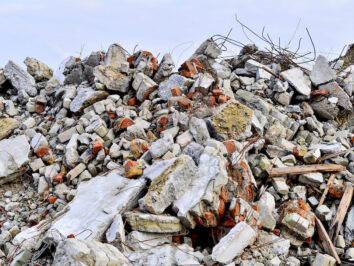Complete Demolition Services for the Chicagoland Area for over 20 years

DEMOLITION CONTRACTOR
Contact Us for a Free Estimate:
708.331.4200
Ensuring that Everything Recovered from Demolition is Never Wasted
Renovation or Disaster Recovery Demolition Services in the Chicago Area
It is not nearly or clearly understood that demolition is just the beginning of the job. Every pound of the thousands of tons of debris redeemed from a project must be carefully sorted, transported and reprocessed into new materials for the construction, landscaping and building trades. KLF Enterprises has all of the equipment to sort, transport, repurpose and recycle concrete, asphalt, steel, building debris, and just about any C&D Waste Material.
What Happens to Your C&D Waste When KLF Enterprises is Done?
What becomes of your demolition debris?

What becomes of Brick & Concrete from your demolition site..
Concrete from demolition debris is rarely clean enough to be immediately reusable for other purposes. The rebar-ridden material must be set aside for machine pounding in order to break the rebar free for removal so that the remaining concrete, along with any brick, may be then loaded into a crusher.
Once in the crusher, the material can start to be reduced into various sizes of aggregate that are used as specified by engineers for a host of different uses: road beds and embankments, backfill for areas requiring quicker drainage, and as the material is made smaller and smaller, it is then used for the aggregate added to Portland cement for foundation walls and slabs.
With a great deal of care in the preparation, creating highly uniformed-sized stone, the material can also be used for paths, rock gardens and even more decorative uses. If it is completely pulverized, then crushed concrete can be used to blend with very acid or compact clays to change the pH or core composition of soils to make them better draining.

What becomes of Asphalt from your material demolition site..
When roadways, parking areas and sidewalks are removed during demolition, the old and broken asphalt is removed and separated to its own stockpile.
Though dried out, broken and seemingly useless to the eyes of the average person, this is actually one of the more precious materials for crushing and grinding. Once added to the crusher, this material goes from being an eyesore to something that can be restored directly back into new cold patch or hot-mix asphalt.
It may be impossible to know for sure, but just think about the asphalt roads, curbs, sidewalks and walkways you have been on, and how it is entirely possible that they were used and reused, formed and reformed again and again.

What becomes of Spoilage from your dig-out excavation demo site..
Spoilage from excavation refers to the waste material generated during the excavation process, such as soil, rocks, debris, and other construction-related waste. In order to prevent environmental damage and depletion of resources, spoilage is tested, recycled, and made ready for future use.
Firstly, spoilage is tested to determine its composition and potential for reuse. Advanced testing methods are used to analyze different aspects of spoilage, including chemical composition, density, and moisture content. This information is crucial in deciding whether the spoilage can be safely and effectively recycled.
If the spoilage is deemed suitable for reuse, it is then recycled. For example, soil can be screened and processed to make it suitable for use in landscaping, gardening, and other applications. Rocks and other solid materials can be crushed and used as aggregate for road and construction projects. This process not only reduces waste but also helps to conserve natural resources and protect the environment.
Finally, recycled spoilage is stored and made ready for future use. This ensures that it is readily available and easily accessible when needed, reducing the need for new excavation and minimizing waste. Additionally, properly storing spoilage reduces the risk of environmental contamination and preserves the quality of the material for future use.
Overall, the process of testing, recycling, and making spoilage ready for future use is essential in promoting sustainability and protecting the environment. By reducing waste and conserving resources, this process supports a more responsible and eco-friendly approach to construction and development.
KLF Enterprises Serves the Entire Region, from Chicagoland to Northwest Indiana from Locations in Chicago and Markham, Illinois
We're Local, Chicago! And We'll Come to You!
Contacting KLF Enterprises Directly:
Telephone: 708.331.4200
Hours of Operation:
Monday: by appointment only
Tues - Fri: 7:00am to 4:00 pm
Sat - Sun: Closed
Find Us on Social Media:
Reach out to Us and We'll Get Right Back!
KLF Enterprises: Chicago
15020 S. Cicero Ave #284 Oak Forest, Illinois 60452
T: 708.331.4200 | E: klfdemo@klfent.com
Media Inquiries: 630.504.7913

KLF Enterprises: Markham
4015 S. Ashland Ave #284 Chicago, IL 60609
T: 708.331.4200 | E: klfdemo@klfent.com
Complete Demolition Services for the Chicagoland Area for Over 20 Years!
© 2023 KLF Enterprises, All Rights Reserved | Site built and maintained by Pilgrim Consulting & Design
